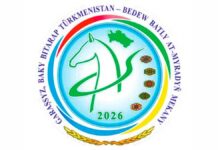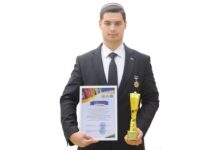A delegation of specialists from Turkmenistan’s State Energy Institute and the Yagshygeldi Kakayev International Oil and Gas University recently completed a training program in Bratislava, Slovakia, as part of the Erasmus+ project “Bridging environmental concerns, societal needs, and good governance in Central Asian education and employment sectors” (ESGCA).
From April 5 to 12th, the Turkmen educators participated in intensive training focused on developing a master’s program addressing ecosystem and social challenges, as well as good governance. The Slovak University of Technology in Bratislava (STUBA), a key partner in this initiative, hosted the seminar titled “Practical Applications of ESG in Sustainable Industry, Higher Education, and Water Management.”
The ESGCA project, funded under the Erasmus+ program for 2021-2027, aims to enhance educational programs in ecology and sustainable development across Central Asia. This project is significantly contributing to improving the quality of higher education in the region by integrating environmental issues with societal needs and good governance principles.
This training in Bratislava followed an initial session held in Sibiu, Romania, from March 22 to 28th. Participants from leading universities in Italy, Romania, Slovakia, and various Central Asian countries engaged in discussions on advanced teaching methodologies, innovative curriculum development, and current global trends in ecology and management. The focus was on bridging theoretical knowledge with practical skills to prepare specialists for careers in ecology, social management, and sustainable development.
The Erasmus+ program facilitates vital experience exchange and partnership building between European and Central Asian institutions. This collaboration strengthens international ties in education and science, enhancing educational program quality and fostering future knowledge exchange and joint research.
Further meetings and training sessions are planned to continue the exchange of best practices and introduce cutting-edge educational approaches. These initiatives will create new opportunities for students and educators in Central Asia, promoting sustainable development throughout the region.
In addition to the training, participants toured the Slovnaft oil refinery complex in Bratislava, a part of the MOL Group, established in 1957. The complex’s implementation of “green production” practices, including eco-friendly materials, energy and water optimization, and carbon emission reduction, provided valuable insights. Educators gained knowledge about the company’s environmental impact minimization strategies, crucial for training future professionals in ecology and sustainable development.
The ESGCA project continues its efforts to develop higher education in Central Asian countries, preparing a new generation of specialists to address global environmental and social challenges.









